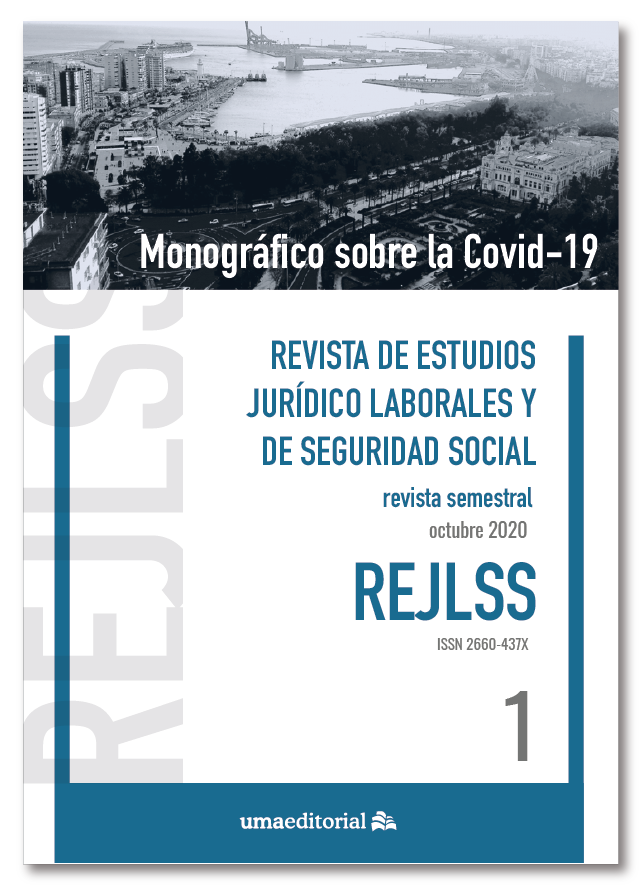Social measures for the reactivation of employment and labour protection and competitiveness of the industrial sector
Normative analysis RDL 24/2020, of 26 june
DOI:
https://doi.org/10.24310/rejlss.vi1.10440Keywords:
cessation of activity, COVID-19, defence of employment, ERTE, socio-labour measures, RDL 24/2020Abstract
The impact of the COVID-19 has been felt suddenly and without notice in employment. From the beginning of the crisis, with Royal Decree-Law 8/2020, urgent mechanisms were put in place to contain employment and continue productive activity (modifications to the ERTES, quota exemptions, extraordinary unemployment benefits, extraordinary cessation of activity...). During the course of the pandemic, these have had to be modulated and extended. This is what RDL 24/2020 of 26 June aspires to, which arises largely from social dialogue. The measures contained in it have the hard work of connecting an extraordinarily tortuous period with normality, but the current rates indicate that this favorable scenario will take a little longer to arrive and will inevitably require new ones.
Downloads
Metrics
References
Molina Navarrete C. “COVID-19 y arte de lo jurídicamente posible: del estrés legislativo al colapso interpretativo”. Revista de Trabajo y Seguridad Social Núm 446, CEF, Madrid, 2020. Págs. 5 a 30.
Rueda Monroy, J. A., “La cláusula de salvaguarda del empleo” en AA.VV. (Vila Tierno, F. Dir.), La respuesta normativa a la crisis laboral por el COVID-19, Laborum, Murcia, 2020, pág.78.
Sempere Navarro, A. V., “El Derecho Laboral, la Pandemia y las preposiciones”, Actualidad Jurídica Aranzadi núm. 964/2020, Editorial Aranzadi, S.A.U., Cizur Menor (Navarra), 2020.
Downloads
Published
How to Cite
Issue
Section
License
In the Revista de Estudios Juridico Laborales y de Seguridad Social (REJLSS) we are clearly committed to a policy of open access to scientific knowledge (See Berlin Declaration).
Those authors who have publications with this journal accept the following terms:
This journal provides immediate free access to its content under the principle of making research freely available to the public. All the contents published in the REJLSS are subject to the Creative Commons license
Attribution-NonCommercial-NoDerivatives 4.0 International (CC BY-NC-ND 4.0)
Copyrights are of two kinds: moral and patrimonial. Moral rights are perpetual, inalienable, non-transferable, inalienable, unattachable and imprescriptible prerogatives. In accordance with Spanish copyright legislation, the authors who publish in REJLSS retain the moral right over their work, as well as the ownership of the patrimonial right, which will be transferred to the University of Malaga for its dissemination in open access.
The patrimonial rights, refer to the benefits that are obtained by the use or disclosure of the works. REJLSS is published in open access and is exclusively authorized to perform or authorize by any means the use, distribution, dissemination, reproduction, adaptation, translation or transformation of the work.
It is the responsibility of the authors to obtain the necessary permissions of the images that are subject to copyright.
Authors whose contributions are accepted for publication in this journal retain the non-exclusive right to use their contributions for academic, research and educational purposes, including self-archiving or depositing in open access repositories of any kind.
The electronic edition of this magazine is edited by the Editorial of the University of Malaga (UmaEditorial), being necessary to cite the origin in any partial or total reproduction.
The authors may adopt other non-exclusive license agreements for the distribution of the version of the published work (eg: deposit it in an institutional telematic archive or publish it in a monographic volume) provided that the initial publication is indicated in this magazine.
Authors are allowed and recommended to disseminate their work through the Internet (eg, in institutional telematic archives or on their website) before and during the submission process, which can produce interesting exchanges and increase citations of the published work.






19.png)
